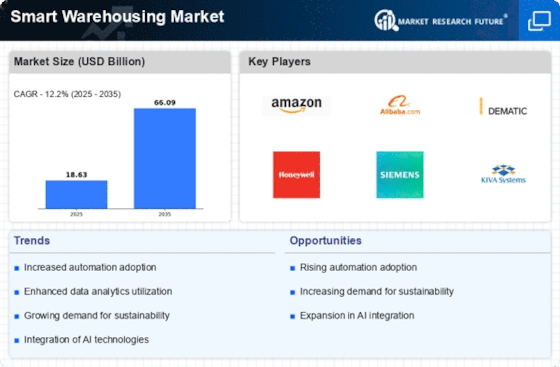Market Analysis
In-depth Analysis of Smart Warehousing Market Industry Landscape
The Smart Warehousing market is driven by a variety of dynamic factors that shape its growth and evolution. One of the key dynamics driving this market is the rapid advancement of technology. As technologies such as artificial intelligence, robotics, Internet of Things (IoT), and big data analytics continue to mature, they are transforming traditional warehouses into smart, interconnected facilities capable of real-time monitoring, analysis, and decision-making. This technological evolution is enabling warehouses to become more efficient, agile, and responsive to changing market demands.
Another significant dynamic is the increasing demand for omnichannel retailing and e-commerce. With the rise of online shopping and the growing expectation for fast, convenient delivery, companies are under pressure to optimize their supply chain operations to meet customer expectations. Smart warehousing solutions play a critical role in this context, enabling companies to streamline order fulfillment processes, reduce delivery times, and improve inventory management to support omnichannel strategies effectively.
Moreover, globalization and the expansion of international trade are driving the need for more sophisticated warehousing solutions. As businesses seek to tap into new markets and expand their global footprint, they require warehousing facilities capable of handling diverse product lines, managing complex supply chains, and complying with international regulations. Smart warehousing technologies provide the visibility, scalability, and flexibility needed to support these global operations efficiently.
Additionally, sustainability has emerged as a significant market dynamic influencing the smart warehousing landscape. With increasing awareness of environmental issues and the growing emphasis on corporate social responsibility, companies are looking for ways to reduce their carbon footprint and minimize waste in their operations. Smart warehousing solutions offer opportunities to optimize energy usage, minimize emissions, and implement eco-friendly practices such as recycling, waste reduction, and sustainable packaging materials.
Furthermore, the COVID-19 pandemic has had a profound impact on the smart warehousing market dynamics. The pandemic has accelerated the adoption of e-commerce and spurred the need for more resilient and agile supply chains capable of responding to disruptions effectively. As a result, there is increased interest in smart warehousing technologies that can enhance visibility, flexibility, and automation to support the rapid shifts in consumer behavior and market dynamics brought about by the pandemic.
Moreover, regulatory factors also play a significant role in shaping the smart warehousing market dynamics. Governments around the world are enacting regulations related to data privacy, safety standards, labor practices, and environmental protection, which impact the design, implementation, and operation of smart warehousing solutions. Companies must navigate these regulatory requirements to ensure compliance and mitigate risks associated with non-compliance
Additionally, market competition and industry consolidation contribute to the dynamic nature of the smart warehousing market. As companies vie for market share and seek to differentiate themselves from competitors, there is constant innovation and evolution in smart warehousing technologies and solutions. Mergers, acquisitions, and partnerships among industry players also shape the competitive landscape, driving further consolidation and influencing market dynamics.

















Leave a Comment